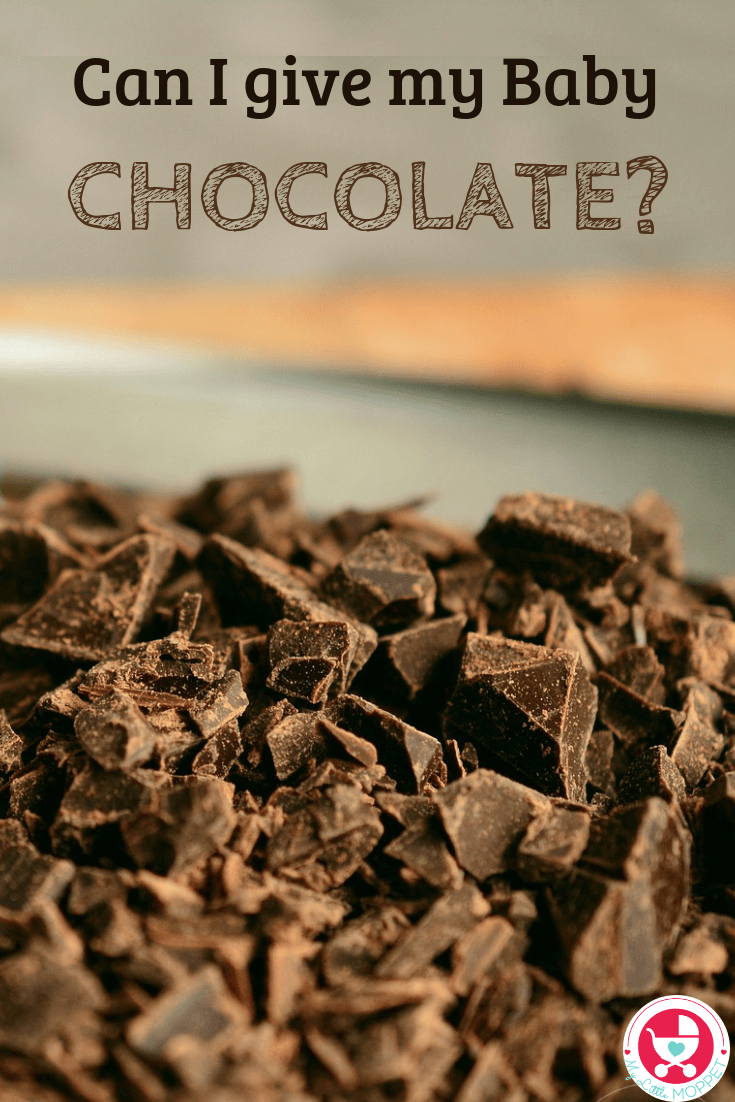Chocolate has fans among all generations – from little ones to seniors! So it makes us wonder: Can I give my Baby Chocolate? Let’s find out!
Raise your hands if you love chocolates!!!! I can assume that most of you are raising your hands! By its very nature, chocolate makes people fall in love with it. Nothing can describe that heavenly feeling when chocolate dissolves into a puddle of gooey-ness slowly in the mouth.
Chocolate is made from the beans of the tropical cacao tree (Theobroma cacao), mostly grown in western Africa. Cacao beans go through multi-stage processes like fermentation, drying, cleaning and grinding. After all this, it’s made into chocolate liquor/cocoa liqor/cacao liqor and cocoa butter. Different types of chocolates are then made by blending the liquor and the butter in varying proportions and by adding nuts, spices, fruits caramel etc.
Chocolate is available in several forms like chips, wafers, bars etc.The major kinds of chocolate are dark chocolate, milk chocolate and white chocolate. Dark chocolates have a higher percent of cacao, when compared to the other varieties and also have essential minerals such as iron, zinc and magnesium.
Health Benefits of Chocolate
- Helps in brain function
- Controls stress
- Provide energy
- Antioxidant rich
- Fights against bad cholesterol and maintains heart health
- Helps to reduce blood pressure
- Protects the skin from hot sun
- Prevents diabetics
- Raises HDL and Protects LDL from Oxidation
- Improves blood flow
Chocolate has fans among people of all ages, and no one is spared. So much that it begs the question:
Can I give my Baby Chocolate?
Even though there are no specific medical guidelines for introducing chocolate to your baby, most experts suggest waiting till the first birthday. One reason is that most varieties of chocolate available today have sugar in them, which isn’t advised for babies under one year. Another reason is that introducing chocolate early can result in a decreased interest towards other, healthier foods. If you wish to introduce chocolate before 1st birthday, it’s important to get the pediatrician’s guidance.
If you do decide to introduce chocolate to your baby, opt for pure dark chocolate without sugar and make sure that there are no potential allergens like nuts, milk powder etc. Even after your baby crosses 1 year, it’s recommended to offer chocolate in moderation, and as a way to flavor other foods.
Even though chocolate is not in the list of high allergy foods, it might cause allergy in babies who are allergic to cocoa or ingredients in chocolate such as milk and nuts. Babies with a gluten intolerance or celiac disease might have allergic reactions to milk chocolate.
While not mandatory, it’s better to follow the 3-day rule to be on the safe side, and start with a small quantity in the beginning. If the baby displays symptoms like itchy rashes, abdominal pain, burning sensation in the mouth, swelling of the face or shortness of breath, he needs to be rushed to the doctor right away.
Tips for Choosing and Feeding Chocolate
- Make sure to read the label.
- Go for chocolate which has cocoa mass and cocoa liquor as the first listed ingredient.
- Try to avoid chocolates with artificial ingredients and loads of sugar.
- Opt for chocolates with a glossy surface
- Avoid chocolates which are scarred and gray, these are the signs of old and over-processed chocolates.
- Avoid chocolates which are chewy, dense and wax like.
- Check for strong chocolate smell.
- The best time to give chocolate is mealtime. The amount of saliva in the mouth increases after meal and helps to neutralize the adverse effects of the tooth-attacking acid.
- Avoid chocolates before bed time.
- Dark chocolate with 70% or greater cocoa is the best
Chocolate Recipes for Kids
Sprouted Ragi Chocolate Muffins
Whole Wheat Chocolate Chip Cookies
Chocolate Sweetheart Yogurt Parfait
Sugar free Whole Wheat Chocolate Orange Cake
Whole Wheat Chocolate Cupcakes


 Download FREE Recipe Ebooks for Babies & Toddlers
Download FREE Recipe Ebooks for Babies & Toddlers















Cocoa contains caffeine..so is it safe to give baby?
Hi,
Cocoa is very high in catechins (polyphenols) Which provide several health benefits like protecting against heart disease and cancer, improving blood pressure and glucose metabolism. It helps with proper blood flow to brain and helps in improving brain function. It’s a part of a healthy diet if taken in moderation